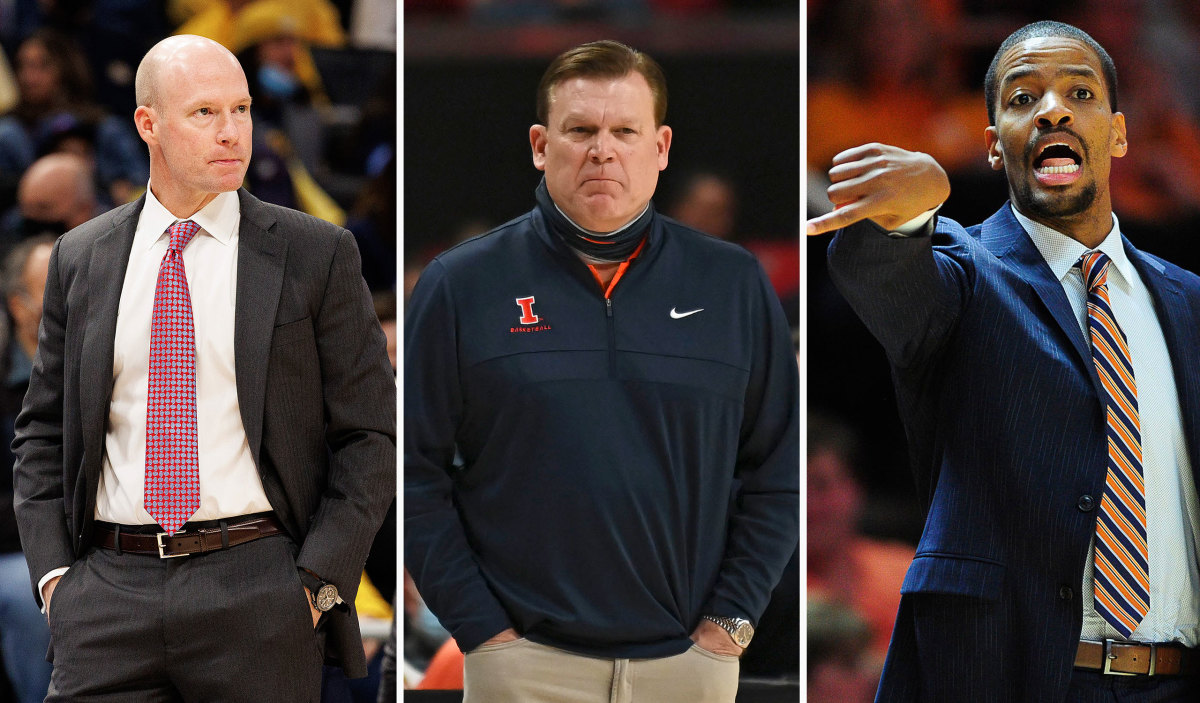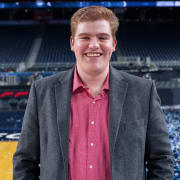College Hoops Mailbag: Louisville and Maryland Coaching Candidates, More
Welcome to Sports Illustrated’s weekly college hoops mailbag with Kevin Sweeney. Here, Kevin will field questions submitted via Twitter and email about a variety of topics in the sport. Have a question you’d like answered in a future mailbag? Send it to @CBB_Central on Twitter or Kevin.Sweeney@si.com (questions around either men’s or women’s basketball are welcome!). Without further ado, let’s get to your questions, which have been lightly edited for grammar and clarity ...
Nick asks: Who is a crazy recommendation for the Louisville gig that no one has mentioned yet?
Well, it feels like just about everyone has been mentioned already for this vacancy, and it has been open officially for 48 hours. SI’s Pat Forde floated the likes of Kenny Payne, Mick Cronin, Matt Painter, Steve Forbes, Mark Pope and Chris Holtmann while ruling out the Bruce Pearl marriage that Louisville fans on Twitter are pining for. Essentially every big-name coach in the SEC has been floated in some form or fashion, as has Baylor’s Scott Drew.
The one name that makes plenty of sense to me that I haven’t seen mentioned yet is Illinois HC Brad Underwood. Underwood has won everywhere he has been, including a remarkable run of success at Stephen F. Austin and an impressive one-year turnaround at Oklahoma State before heading to Champaign. The thing I like most about Underwood is his willingness to adapt: The system he ran at SFA and OSU didn’t work in the Big Ten, so he brought in a new staff and changed the way he operates on both ends of the floor. He recruits well and plays a fun brand of basketball. Plus, he is used to life inside the pressure cooker of a rabid fan base at Illinois. There’s no guarantee he’d take the job, but he seems worth mentioning in the same vein as a lot of the established high-major winners that have been on hotlists everywhere for this job.

Wayne asks (via email): Who do you see as top candidates for Maryland basketball’s next head coach? Would Marquette’s impressive season make Shaka Smart’s return to the East Coast a consideration?
The Maryland job has now been open for nearly two months, and somehow, I think there’s less clarity now on the Terps’ search than there was when Mark Turgeon first stepped away in early December. First, Louisville’s opening this week means Maryland is no longer the best available job in the country and also takes away any advantage the Terrapins might have had of being early into the market. The elite names (Pearl, Holtmann, Eric Musselman, Nate Oats, etc) that some had mentioned early on for Maryland seem unlikely to leave their current homes, and if they do, the Louisville job would be more attractive. Plus, a top “realistic” candidate in Seton Hall coach Kevin Willard has seen his team’s season go off the rails in January and made some puzzling comments to the media this week after a home blowout loss to St. John’s. I still think Willard should be a candidate for the Maryland job, but he’s far less of a slam dunk than he ever may have been.
Other good candidates for the job right now would be USC’s Andy Enfield, George Mason’s Kim English and Providence’s Ed Cooley. Cooley and Enfield probably can’t get the Louisville job, but Maryland would be a clear step up and both are having strong seasons. Cooley’s energetic personality would play well in College Park, and if he can break through in the NCAA tournament this year he’ll only become more attractive. Meanwhile, English at George Mason is one of the sport’s rising stars and is off to a 3–1 start in A-10 play after making waves by beating Maryland in the nonconference. He’s a gamble, but one that could pay off.
I’d be very, very surprised if Shaka Smart enters himself into the mix for jobs this spring. Marquette feels very comfortable for him, especially as a native of the state. It’s a basketball-focused job, which is the right fit for him after spending time at Texas. Plus, the resources at Marquette are the best in the Big East. I think he’s fully focused on building a program at Marquette, particularly after this surprising Year 1.
Max asks: Can the Mountain West get five bids? And how far off is Fresno State?
Personally, I think four bids is the ceiling for the Mountain West, and I think realistically it’s more likely to be three. Unfortunately, the best way for teams at the top of the Mountain West to solidify their at-large hopes is to beat the other best teams in the league. And unless they all go something close to .500 against each other, the schedule will essentially sort out who is good enough to go dancing and who isn’t. Colorado State remains in the best position for an at-large, while everyone else in the league looks like they’ll be sweating.
As for Fresno State, I think the Bulldogs are the least likely of the five currently in contention for an at-large. They’re the only at-large contender in the league without a Quadrant I win, and their NET ranking also places them fifth in the league. KenPom even favors Utah State over the Bulldogs. Those are the components of an NIT résumé, not an at-large bid. They have five games left against the teams above them in the league and need to win a minimum of three of those games to remain in the conversation. The world does deserve the chance to watch Orlando Robinson in March though.
Matt asks: What are the odds of a nine-bid Big 12, a three-bid ACC, and a one-bid AAC at this point (scenarios which are obviously connected to each other)?
Let’s take a look at each of these individually, though, as Matt points out, the odds of more Big 12 bids improve with every ACC and AAC casualty.
Personally, I think the chances of a nine-bid Big 12 are quite slim, even though every team might be NCAA tournament-caliber or close. My reason why is pretty simple: I’m pretty sure someone in the Big 12 is going to go 6–12 in the league, and a team that goes 6–12 in conference play isn’t going to get an at-large bid. The path to nine bids (with ineligible Oklahoma State the only straggler) would have required the Cowboys to bottom out and hand out wins to the rest of the league. That hasn’t happened. I’d imagine one or both of TCU and Kansas State will miss out.
A three-bid ACC feels slightly more likely than the nine-bid Big 12, but I still think it finds a fourth and maybe even a fifth. Duke is a lock. Wake Forest looks to be in good shape and the Demon Deacons’ metrics continue to rise. Miami already has eight Q1 and Q2 wins, including the road win at Cameron Indoor. I feel good about those three teams finding their way into the field. Add in a bubblicious North Carolina team that I still think finds a way and the door not being closed on Notre Dame or Florida State, and I think there’s a clear path to four or five bids, ignoring a surprise run by someone in the conference tournament to steal the autobid.
As for a one-bid AAC, I think that’s more likely than not at this point. There’s only one at-large team in the league in Houston, though Cincinnati and SMU could still make a push. Star-studded Memphis is autobid or bust at this point. Two bids feel like the realistic ceiling right now, and I’d be a bit surprised if it’s not a one-bid league from an at-large perspective.
Bryan asks: What is wrong with Fred Hoiberg? Can he turn it around?
Nebraska is a hard job, without question. But considering Hoiberg’s qualifications, his flop of a tenure in Lincoln so far feels hard to explain. Here’s my best crack at it:
Hoiberg is college basketball’s Chip Kelly. Like Kelly with the up-tempo, no-huddle offense, Hoiberg was doing something before the rest of the country was at Iowa State: recruiting the transfer market (before it was called the portal) and playing an NBA-style spread ball screen offense. That helped him land elite players like DeAndre Kane, Will Clyburn and Melvin Ejim. He then left for the professional game, and when he returned to college (at a harder job, I might add) the rest of the college game had caught up. Now, most teams use the portal to recruit and a whole lot of teams play ball screen-heavy offenses.
Now, I don’t think Nebraska’s roster is bad right now, but it’s obviously a far cry from what he had at ISU. I think the thing that stands out when looking back at the Cyclones teams Hoiberg had is they always had multiple ballhandlers with great size who had high hoops IQs. With the exception of Dalano Banton (who went pro after one year in Lincoln), I’m not sure Hoiberg has had that type of player in Lincoln. At this point, I have a hard time seeing him turning things around, particularly with how deep the Big Ten is. The bottom line for me is right now, I don’t see anything special about what Hoiberg does as a coach, and I did at Iowa State.
More College Basketball Coverage:
• After Final Four, UCLA Is Embracing Its New Role
• What Now For Louisville Post-Chris Mack?
• The Drive That Fuels Johnny Davis, Breakout Star
